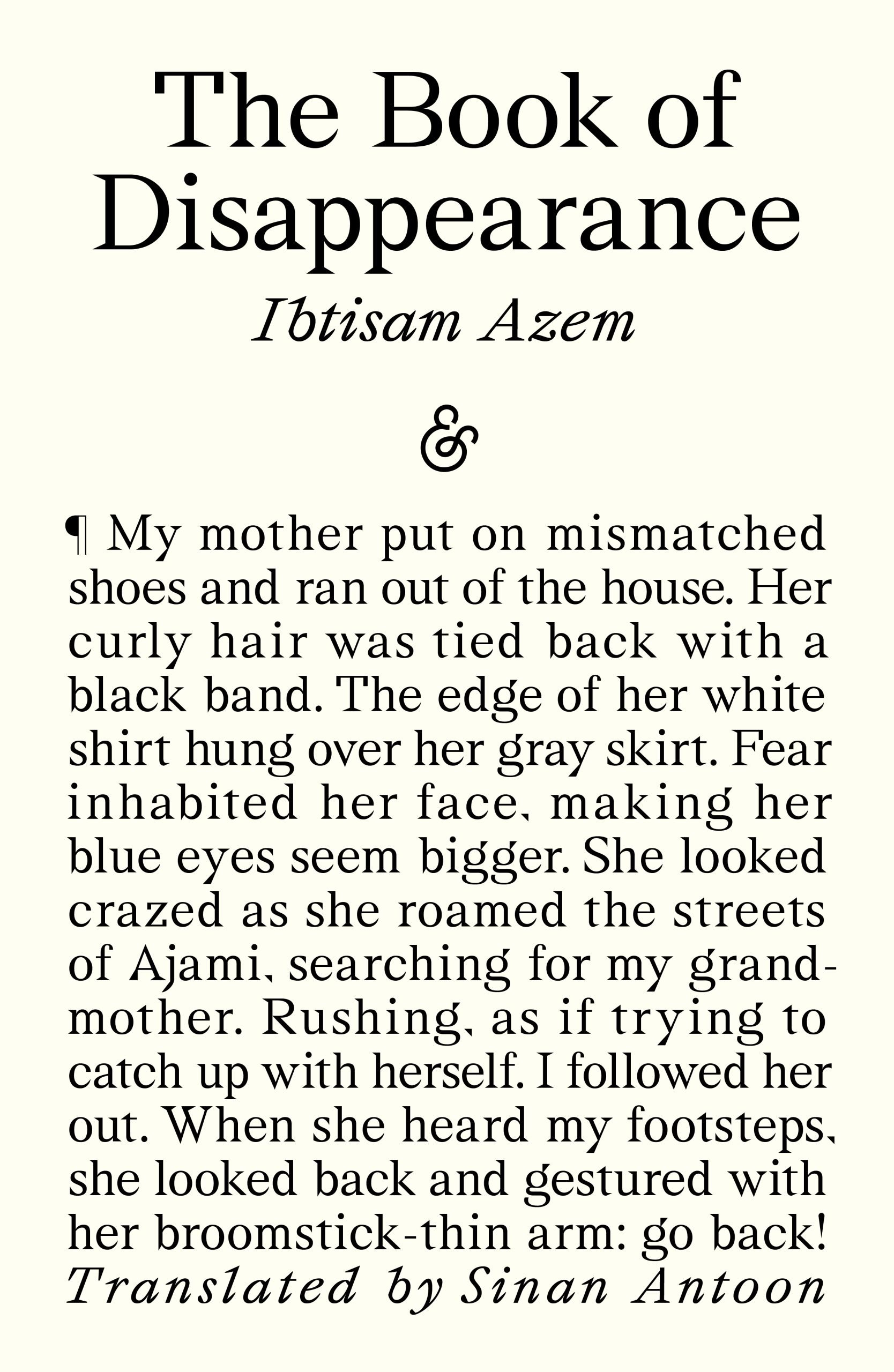[Jadaliyya Co-Editor Ibtisam Azem's The Book of Disappearance was featured on the International Booker Prize's 2025 Longlist. Click here to purchase a copy of the book.]
The longlist for the International Booker Prize 2025 has been announced, featuring 13 authors longlisted for the first time. The longlist of 13 books – 11 novels and two collections of short stories – was chosen by the 2025 judging panel, chaired by bestselling Booker Prize-longlisted author Max Porter. The other judges are: prize-winning poet, director and photographer Caleb Femi; writer and Publishing Director of Wasafiri Sana Goyal; author and International Booker Prize-shortlisted translator Anton Hur; and award-winning singer-songwriter Beth Orton.
The list celebrates the best works of long-form fiction or collections of short stories translated into English and published in the UK and/or Ireland between 1 May 2024 and 30 April 2025, as judged by the 2025 panel. The judges made their selection from 154 books submitted by publishers – the highest number since the prize was launched in its current format in 2016.
The International Booker Prize 2025 shortlist of six books will be announced on Tuesday, 8 April. The winner will be announced at a ceremony at London’s Tate Modern on Tuesday, 20 May.
The Book of Disappearance by Ibtisam Azem
What if all the Palestinians in Israel simply disappeared one day? What would happen next? How would Israelis react? These unsettling questions are posed in Ibtisam Azem’s powerfully imaginative novel?
Alaa is haunted by his grandmother’s memories of being displaced from Jaffa and becoming a refugee in her homeland after the Nakba. Ariel, Alaa’s neighbour and friend, is a liberal Zionist, critical of the military occupation of the West Bank and Gaza yet faithful to the project of Israel. When he wakes up one morning to find that all Palestinians have suddenly vanished, Ariel begins searching for clues to the secret of their collective disappearance.
That search, and Ariel’s reactions to it, intimately reveal the fissures at the heart of the Palestinian question. Between the stories of Alaa and Ariel are the people of Jaffa and Tel Aviv – café patrons, radio commentators, flower-cutters – against whose ordinary lives these fissures and questions play out.
Spare yet evocative, intensely intelligent in its interplay of perspectives, The Book of Disappearance – which was critically acclaimed in its original Arabic edition – is an unforgettable glimpse into contemporary Palestine as it grapples with both the memory of loss and the loss of memory.
Judges Remarks
"Speculative and meditative, haunting and deeply humane, Azem’s second novel is an exceptional exercise in memory-making, history, and psycho-geography. The premise – the overnight disappearance of all Palestinians – is at once ambitious and audacious, shocking and unsettling. The author dares us to imagine, and from this place of imagination erupts a challenge: to read differently, against the grain. The book alternates between the perspectives of Alaa (whose grandmother was displaced during the Nakba) and his neighbour-friend Ariel (a liberal Zionist journalist), between past and present. Azem’s strength is in having fun with a conceit that’s not for the faint-hearted. We found that this palimpsestic and potent novel – originally published over a decade ago, and translated into English with a coolness and spareness – offered newfound socio-political, moral and emotional resonances and implications in the current climate."
About the Author and Translator
Ibtisam Azem is a Palestinian novelist, short story writer, and journalist based in New York. She was born and raised in Taybeh, near Jaffa, the city from which her mother and maternal grandparents were internally displaced in 1948. She lived in Jerusalem and studied at the Hebrew University before moving to Germany and later to the US. She has published two novels in Arabic: The Sleep Thief (2011) and The Book of Disappearance (2014). Her first short story collection, City of Strangers, is forthcoming in Arabic in the summer of 2025. The Book of Disappearance has been translated into English, Italian, and German, and was longlisted for the International Booker Prize 2025. Azem’s short stories and essays have appeared in several anthologies and various magazines, including Evergreen Review, Journal of Palestine Studies, World Literature Today, and Jadaliyya. Azem holds an MA in Islamic and Middle Eastern Studies with minors in German and English Literature from Freiburg University, as well as an MA in Social Work from NYU.
Born in Baghdad, Sinan Antoon is a poet, novelist, and translator. Antoon holds degrees from Baghdad, Georgetown, and Harvard, where he specialised in Arabic literature. He has published five novels and two poetry collections. His most recent work is Postcards from the Underworld (Seagull, 2023). His translation of Mahmoud Darwish’s In the Presence of Absence won the 2012 American Literary Translators’ Award. He is an associate professor at New York University. His essays and op-eds in English have appeared in The New York Times, The Guardian, The Nation, and Journal of Arabic Literature, among others. Antoon returned to his native Baghdad in 2003 to co-direct About Baghdad, a documentary about the lives of Iraqis in a post-Saddam-occupied Iraq. He is co-founder and co-editor of Jadaliyya and associate professor of Arabic literature at New York University. His English-language translation of The Book of Disappearance by Ibtisam Azem was longlisted for the International Booker Prize 2025.
